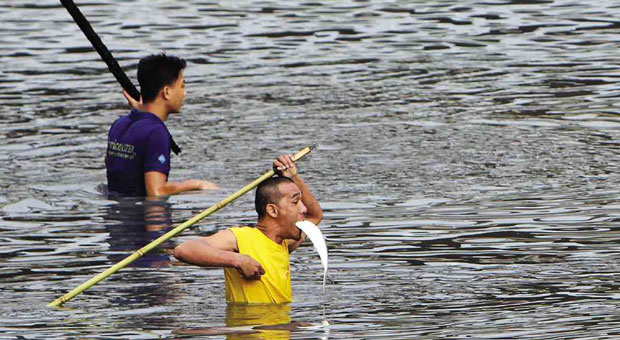MANILA, Philippines–They may come cheap, but better check where they come from.
Local health officials are warning the public against buying and consuming bangus and tilapia that were caught in the Pasig River in the wake of Typhoon Glenda, whose strong winds destroyed fish pens in Laguna de Bay on Wednesday and released their stock into the polluted waterway.
Plump milkfish and St. Peter’s fish have since been caught in the river which passes through the cities of Taguig, Pasig, Makati, Mandaluyong and Manila, kilometers away from the fish farms in the lake.
But in a statement on Thursday, the Makati City Health Department said “fish and other marine life from the said river may contain a number of toxic chemicals, including methylmercury, which have been found harmful to the nervous system and causing mental and physical retardation in children, and other diseases like cancer.”
The office said it issued the warning after residents in Makati and neighboring cities were seen flocking to the river for the easy catch.
In Barangay (village) Pinagbuhatan in Pasig, bangus were being sold Thursday at only P20 to P40 per kilo—down from the pre-Glenda price of P90 to P100.
In Barangay Napindan in Taguig, a village at the mouth of the river that opens to Laguna de Bay, Peter Pabera said he had so far caught about 300 pieces of live milkfish after Glenda’s passing.
“We started around 2 p.m. Wednesday, when we were selling them at P50 per kilo,” said the 38-year-old fisherman. “Now it’s down to P20 a kilo.”
Joining him to partake of the bangus bonanza are 300 fishermen from his community alone.
But when told of the health warnings, a female fish vendor who had put up a stall under the Napindan Bridge said: “Nobody has come here to stop us from selling.”
“Of course, we have eaten them ourselves and we won’t be selling them if they are not safe,” she said.–With reports from Maricris Irene V. Tamolang and Kristine Felisse Mangunay
Mandaluyong City residents flock to the riverbanks as news of an easy catch spread Thursday. JOAN BONDOC
RELATED STORIES
Political will needed to clean up Pasig—Drilon
Coliform prompts Batangas river rehab
